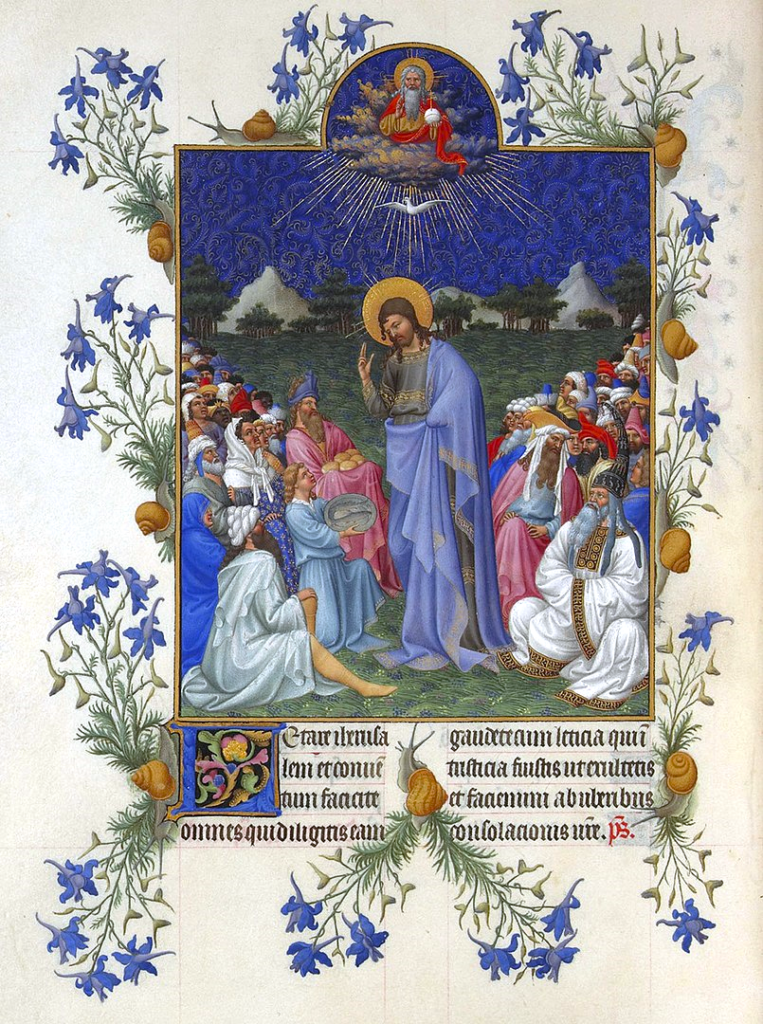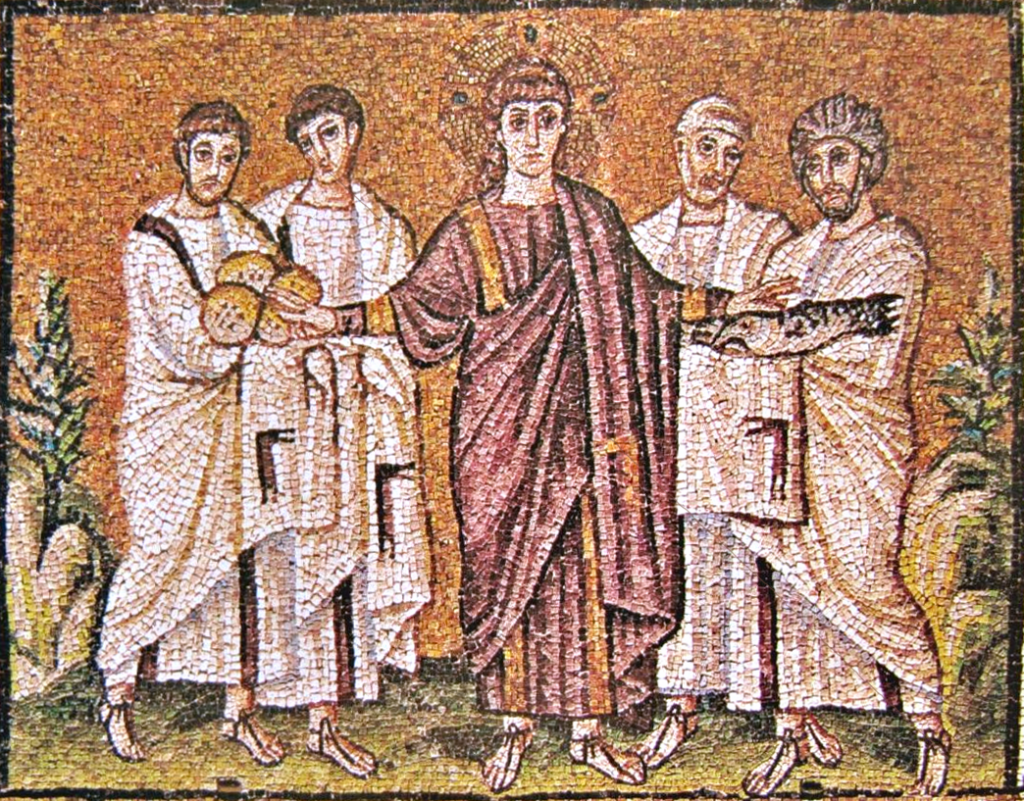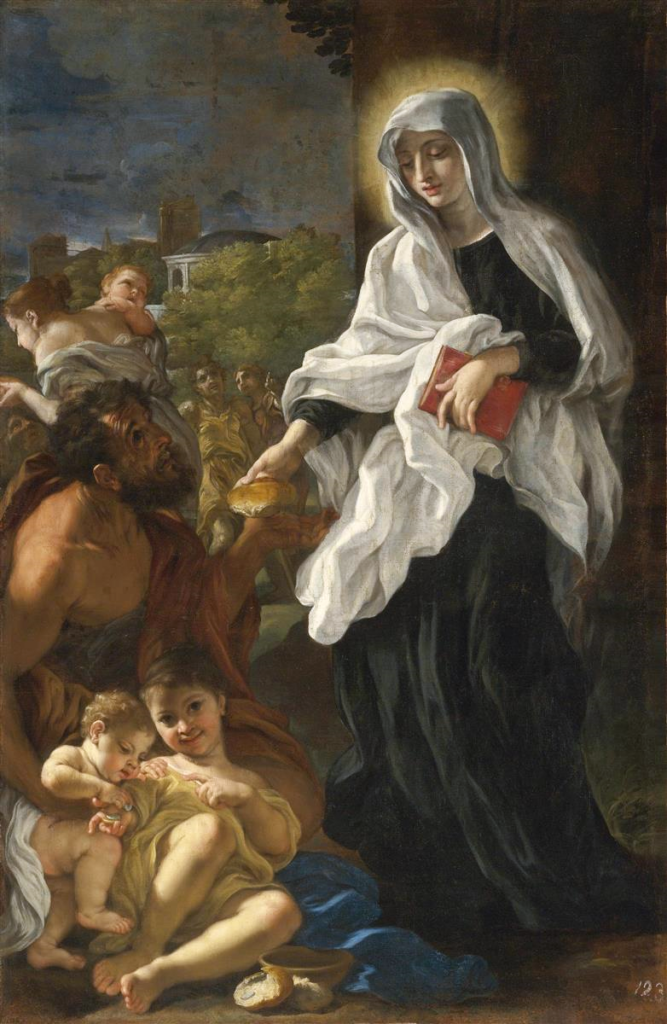Translation of the Holy Gospel According to John
At that time, Jesus went over the Sea of Galilee which is that of Tiberias; and a great multitude followed Him, because they saw the miracles which He did on them that were diseased. Jesus therefore went up into a mountain, and there He sat with His disciples. Now the pasch, the festival day of the Jews, was near at hand. When Jesus therefore had lifted up His eyes, and seen that a very great multitude cometh to Him, He said to Philip, Whence shall we buy bread that these may eat? And this He said to try him; for He Himself knew what He would do. Philip answered Him, Two hundred penny-worth of bread is not sufficient for them, that every one may take a little. One of His disciples, Andrew, the brother of Simon Peter, saith to Him, There is a boy here that hath five barley loaves and two fishes; but what are these among so many? Then Jesus said: Make the men sit down. Now there was much grass in the place. The men therefore sat down, in number about five thousand. And Jesus took the loaves; and when He had given thanks, He distributed to them that were set down. In like manner also of the fishes, as much as they would. And when they were filled, He said to His disciples, Gather up the fragments that remain, lest they be lost. They gathered up therefore, and filled twelve baskets with the fragments of the five barley loaves, which remained over and above to them that had eaten. Now those men, when they had seen what a miracle Jesus had done, said, This is of a truth the prophet that is to come into the world. Jesus therefore, when He knew that they would come to take Him by force and make Him king, fled again into the mountain Himself alone.
From St. John Chrysostom’s Homilies on John, No. XLII.
And He said unto His disciples, ‘Gather up the fragments which remain;’ —and they gathered them together, and filled twelve baskets.
This was not a superfluous show, but in order that the matter might not be deemed a mere illusion; and for this reason He createth from matter already subsisting. “But why gave He not the bread to the multitudes to bear, but (only) to His disciples?” Because He was most desirous to instruct these who were to be the teachers of the world. The multitude would not as yet reap any great fruit from the miracles, (at least they straightway forgot this one and asked for another,) while these would gain no common profit. And what took place was moreover no ordinary condemnation of Judas, who bore a basket. And that these things were done for their instruction is plain from what is said afterwards, when He reminded them, saying, Do ye not yet understand—how many baskets ye took up? (Matt 16:9). And for the same reason it was that the baskets of fragments were equal in number to the disciples; afterwards, when they were instructed, they took not up so many, but only seven baskets. (Matt 15:37). And I marvel not only at the quantity of loaves created, but besides the quantity, at the exactness of the surplus, that He caused the superabundance to be neither more nor less than just so much as He willed, foreseeing how much they would consume; a thing which marked unspeakable power. The fragments then confirmed the matter, showing both these points; that what had taken place was no illusion, and that these were from the loaves by which the people had been fed. As to the fishes, they at this time were produced from those already subsisting, but at a later period, after the Resurrection, they were not made from subsisting matter. “Wherefore?” That thou mayest understand that even now He employed matter, not from necessity, nor as needing any base (to work upon), but to stop the mouths of heretics?

And the multitudes said, that this is of a truth The Prophet.
Oh, excess of gluttony! He had done ten thousand things more admirable than this, but nowhere did they make this confession, save when they had been filled. Yet hence it is evident that they expected some remarkable prophet; for those others had said (to John), Art thou that Prophet? while these say, This is that Prophet.
When Jesus therefore perceived that they would come and take Him by force to make Him a king, He departed again into a mountain.
Wonderful! How great is the tyranny of gluttony, how great the fickleness of men’s minds! No longer do they vindicate the Law, no longer do they care for the violation of the Sabbath, no longer are they zealous for God; all such considerations are thrown aside, when their bellies have been filled; He was a prophet in their eyes, and they were about to choose Him for a king. But Christ fleeth. “Wherefore?” To teach us to despise worldly dignities, and to show us that He needed nothing on earth. For He who chose all things mean, both mother and house and city and nurture and attire would not afterwards be made illustrious by things on earth. The things which (He had) from heaven were glorious and great, angels, a star, His Father loudly speaking, the Spirit testifying, and Prophets proclaiming Him from afar; those on earth were all mean, that thus His power might the more appear. He came also to teach us to despise the things of the world, and not be amazed or astonished by the splendors of this life, but to laugh them all to scorn, and to desire those which are to come. For he who admires things which are here, will not admire those in the heavens. Wherefore also He saith to Pilate, My Kingdom is not of this world (John 18:36), that He may not afterwards appear to have employed mere human terror or dominion for the purpose of persuasion. Why then saith the Prophet, Behold, thy King cometh unto thee, meek, and sitting upon an ass? (Zech 9:9). He spake of that Kingdom which is in the heavens, but not of this on earth; and on this account Christ saith, I receive not honor from men (ibid. 5:41).
Learn we then, beloved, to despise and not to desire the honor which is from meal for we have been honored with the greatest of honors, compared with which that other is verily insult, ridicule, and mockery. And as the riches of this world compared with the riches of that are poverty, as this life apart from that is deadness, (for let the dead bury their dead —Matt 8:28,) so this honor compared with that is shame and ridicule. Let us then not pursue it. If they who confer it are of less account than a shadow or a dream, the honor itself much more so. The glory of man is as the flower of the grass (1 Pet 1:24); and what is meaner than the flower of the grass? Were this glory everlasting, in what could it profit the soul? In nothing. Nay, it very greatly injures us by making us slaves, slaves in worse condition than those bought with money, slaves who obey not one master only, but two, three, ten thousand, all giving different commands. How much better is it to be a free man than a slave, to be free from the slavery of men, and subject only to the dominion of God? In a word, if thou wilt desire glory, desire it, but let it be the glory immortal, for that is exhibited on a more glorious stage, and brings greater profit. For the men here bid thee be at charges to please them, but Christ, on the contrary, giveth thee an hundredfold for what thou givest Him, and addeth moreover eternal life. Which of the two then is better, to be admired on earth, or in heaven? by man, or by God? to your loss, or to your gain? to wear a crown for a single day, or for endless ages? Give to him that needeth, but give not to a dancer, lest thou lose thy money and destroy his soul. For thou art the cause of his (coming to) perdition through unseasonable munificence. Since did those on the stage know that their employment would be unprofitable, they would have long ago ceased to practice it; but when they behold thee applauding, crowding after them, spending and wasting thy substance upon them, even if they have no desire to follow (their profession), they are kept to it by the desire of gain. If they knew that no one would praise what they do, they would soon desist from their labors, by reason of their unprofitableness; but when they see that the action is admired by many, the praise of others becomes a bait to them. Let us then desist from this unprofitable expense, let us learn upon whom and when we ought to spend. Let us not, I implore you, provoke God in both ways, gathering whence we ought not, and scattering where we ought not; for what anger doth not thy conduct deserve, when thou passest by the poor and givest to a harlot? Would not the paying the hire of sin and the bestowing honor where it were meet to punish have been a charge against thee, even hadst thou paid out of thy just earnings? but when thou feedest thine uncleanness by stripping orphans and wronging widows, consider how great a fire is prepared for those who dare such things. Hear what Paul saith, Who not only do these things, but also have pleasure in them that do them. (Rom 1:32).
Perhaps we have touched you sharply, yet if we touch you not, there are actual punishments awaiting those who sin without amendment. What then availeth it to gratify by words those who shall be punished by realities? Dost thou take pleasure at a dancer, dost thou praise and admire him? Then art thou worse than he; his poverty affords him an excuse though not a reasonable one, but thou art stripped even of this defense. If I ask him, “Why hast thou left other arts and come to this accursed and impure one?” he will reply, “because I can with little labor gain great profits.” But if I ask thee why thou admirest one who spends his time in impurity, and lives to the mischief of many, thou canst not run to the same excuse, but must bow down thy face and be ashamed and blush. Now if when called by us to give account, thou wouldest have nothing to reply, when that terrible and inexorable Judgment cometh where we shall render account of thoughts and deeds and everything, how shall we stand? with what eyes shall we behold our Judge? what shall we say? what defense shall we make? what excuse reasonable or unreasonable shall we put forward? shall we allege the expense? the gratification? the perdition of others whom by means of his art we ruin? We can have nothing to say, but must be punished with a punishment having no end, knowing no limit. That this come not to pass, let us henceforth guard all points, that having departed with a good hope, we may obtain the everlasting blessings; to which may we all attain through the grace and lovingkindness of our Lord Jesus Christ, by whom and with whom to the Father and the Holy Ghost be glory, now and ever and world without end, Amen.


